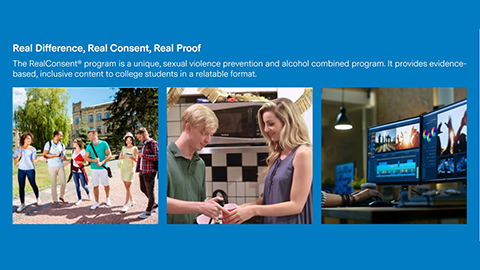RealConsent
Making a Real Difference: Sexual Assault Prevention & Alcohol Education
College-aged women experience high levels of sexual violence, more so than any other age group. Most interventions that were created in response to this issue were in-person trainings. However, web-based interventions were becoming somewhat popular in the early 2000s, especially in mental health. Laura Salazar, PhD, a behavioral scientist, thought it would be beneficial to put together a web-based intervention to prevent sexual violence. This led to the development of RealConsent™, an online training program targeted towards college-aged students for sexual assault prevention and alcohol use education.

Laura Salazar
Laura Salazar, formerly with Emory’s School of Public Health, is now a professor in Health Promotion and Behavior at the School of Public Health at Georgia State University. Salazar’s undergraduate degree was in finance, but after raising children and working throughout the world of finance, she realized she wanted to broaden her education and began a PhD program in psychology. She was especially interested in studying violence against women and originally thought that she wanted to be a clinical psychologist. However, she eventually learned about and became invested in the field of community psychology and opted to pursue that path. She was exposed to a lot of research opportunities and was able to participate in a project where she evaluated a coordinated community response to domestic violence. This was Salazar’s first exposure to interventions that could be implemented at the community level to stop intimate partner violence.
Later, as Salazar became a faculty member, she was able to take her experiences and expertise in community physiology to come up with a more efficient way to reach college students about the issue of sexual violence. Her work had informed her that college-aged students were at high risk for sexual violence, so she focused her efforts on them and developed the original idea for RealConsent™. RealConsent™ is a web-based sexual violence prevention program that was funded through the Centers for Disease Control and Prevention (CDC). Her design focused on a multi-step approach consisting of six modules and has been clinically validated with a large sample of college men.

RealConsent Screen
Each of the program’s six modules is around half an hour, and the objective of each module focuses on specific protective factors for preventing the perpetuation of sexual violence, either through expanding upon the theoretical framework, or informed through examples from empirical research. For example, one module focuses on defining what ‘real’ consent is to the participant of the program, and another module focuses on establishing empathy for sexual violence victims and dispelling rape myths. Alcohol use is highly correlated with incidents of sexual violence, so the program also includes a module that focuses on how alcohol could negate the informed consent process. There is also the bystander intervention model, which aims to teach young men how to step up and involve themselves to prevent someone else from perpetrating or experiencing sexual violence.
At the time RealConsent™ was first developed, there were several in-person programs available to prevent sexual violence, some targeted to male students and some targeted to reduce the risk of victimization for female students. However, there were no web-based alternatives to the in-person trainings. “Web-based interventions at that time were innovative,” says Salazar, “because it had low resource requirements for implementation and was easy to disseminate across various college campuses.” Salazar researched extensively to ensure that her web-based intervention was relevant to the population and engaging for participants. She looked at several theoretical frameworks and decided that the key to the program was educational entertainment. RealConsent™ was designed to be entertaining but also to educate and change attitudes about consent.

RealConsent Screen
Colleges are currently mandated to provide sexual violence prevention programming as a condition to receive federal funds. Due to this, various companies have created sexual violence prevention programming. What makes RealConsent™ stand out as an intervention is the formative work with the targeted population, the clinical data that proves the program’s effectiveness through a rigorous randomized clinical trial, and the inclusion of an alcohol prevention module.
Recently, Salazar has received additional funding from the NIH to test the female version of the RealConsent™ product. It is currently being promoted in a package along with the male counterpart to colleges across the nation.
For more information on RealConsent, visit the program’s website at: https://realconsent.com/